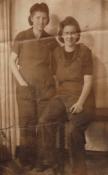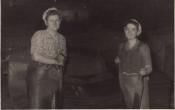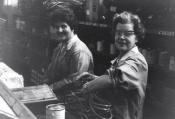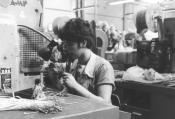Browse the interviews
Sorted by factory location
Aberafan: Mansel Tinplate Works
VSE040 Isabel Thomas, Mansel Tinplate Works, Aberafan;Wern Aluminium works, Aberafan;Metal Box, Neath
Isabel left school at 14 (1942) and went to work in Mansel Tinplate (she was an orphan). Her sister was working there and told the manager Isabel was 16. She learned various tasks: on sheers, guillotine. She cheated her age again to go to the Wern. She describes cutting the tin plate and women also worked the roller there. It went into water and had to be straightened again. Dungarees with patches. Cut fingers. One women killed in the aluminium works. Isabel was overworked. Shift work in the Wern. One boy was killed in the Mansel too – the sheets fell on him. In the Wern the aluminium was coming out of the salt bath hot. They wore thick gloves. Union member. Learning to swear. Story about giving the foreman a laxative. Describes her work in the Wern. Scraping aluminium – half hour on half off - in restroom. Her sister made a rag mat – from someone’s coat! Singing with the piano in the canteen in Wern. Men home from war to the women’s jobs and having much better pay. Dances and music. Not allowed to go to Margam during the war because there were Americans there. Notes racism. She stayed in the Wern 5 years but they cut her wage and she moved to the canteen. She was in the Mansel for 2 years. She worked then in Metal Box for three months c. 1952. She made lids for tomato tins – cushy job.Part of this interview is available as an audio file


Aberafan: Wern Aluminium works
VSE040 Isabel Thomas, Mansel Tinplate Works, Aberafan;Wern Aluminium works, Aberafan;Metal Box, Neath
Isabel left school at 14 (1942) and went to work in Mansel Tinplate (she was an orphan). Her sister was working there and told the manager Isabel was 16. She learned various tasks: on sheers, guillotine. She cheated her age again to go to the Wern. She describes cutting the tin plate and women also worked the roller there. It went into water and had to be straightened again. Dungarees with patches. Cut fingers. One women killed in the aluminium works. Isabel was overworked. Shift work in the Wern. One boy was killed in the Mansel too – the sheets fell on him. In the Wern the aluminium was coming out of the salt bath hot. They wore thick gloves. Union member. Learning to swear. Story about giving the foreman a laxative. Describes her work in the Wern. Scraping aluminium – half hour on half off - in restroom. Her sister made a rag mat – from someone’s coat! Singing with the piano in the canteen in Wern. Men home from war to the women’s jobs and having much better pay. Dances and music. Not allowed to go to Margam during the war because there were Americans there. Notes racism. She stayed in the Wern 5 years but they cut her wage and she moved to the canteen. She was in the Mansel for 2 years. She worked then in Metal Box for three months c. 1952. She made lids for tomato tins – cushy job.Part of this interview is available as an audio file


Aberbargoed: St Margaret's Clothing Factory
VSE066 Alice Jill Baker, St Margaret's Clothing Factory, Aberbargoed
Jill left school at 16 (1953) and started in the garment factory, making clothes for M&S. They made blouses, men’s pyjamas and liberty bodices. She discusses the different jobs. Jill had polio as a child and in the factory the treadle of the machine was adjusted for her. Piecework, - collars would be 2/6 a dozen. She was good at collars and zips. She could do 10 dozen zips a day. She explains the intricacies of working for bonuses. Time and motion. The buyers for M&S were very thorough. She enjoyed the company but hated sewing. Although some were rough and swore they would help others out if necessary. Other factories in England and there would be a beauty queen competition in Bargoed itself. They also had a newsletter. Wages - to mother and pocket money. Not on board and lodging until 18. She talks about the new fall-back rate which meant less money and she walked out because it was unfair and because the supervisor was rude to her. She had worked there for 10 years. She returned part time later but by then, things weren't the same. Factory work was an experience for her.Abercynon: AB Metals
VSE028 Marion Blanche Jones, Hoover, Merthyr;Teddington Aircraft, Merthyr;Birmingham Small Arms, Dowlais;AB Metals, Abercynon;Kayser Bondor, Merthyr
Marion left school at c.16 (1951) and started in Kayser Bondor – until 1958. She feels they were pushed form pillar to post and so she left. Didn’t have a permanent job there so difficult to earn well. Singing and waving to their favourite songs. Moved to AB Metals – making TV tuners. Made redundant after 2-3 years – TV unit closed. In Kayser Bondor not earning much – crying coming home. Loved working In AB Metals. Gave her mother all her wages until she died (1960). Next to BSA making parts for guns. – closed down after a year. Then to Teddington’s making parts for aeroplanes. Cleaning coils under a microscope. Then to Hoover’s 1963. £10 a week and a weekly, monthly and Xmas bonus. Then equality became an issue. Member of union and shop steward. Working on new disposal bags. Once Equal Pay Act ,1970 passed – men became bitter. They knew Ford’s women (Dagenham) had had equal pay. Women contacted Ann Clwyd for advice. They went to management but convenor said they weren’t doing the same work as men. Men went on strike but had to give in, but animosity for years. Not fighting firm but the union. Describes changes in machines. C. 7000 employees in three MT factories. Hoover’s recognised 5,10,15,20 and 25 years service- necklaces. Good staff discounts. Years of wear and tear on body. Noisy and compensation. Section dos, but things changed as other companies took over. Left in 1992 after 29 years.

VSE069 Kath Mathias, AB Metals, Abercynon;Kayser Bondor, Merthyr;Pentrebach polish factory, Merthyr
Kathleen left school at 15 (1955) and started in the office in the polish factory for nine months. It was dark and gloomy so she moved to Kayser Bondor. She worked in the ticketograph office – wages paid according to tickets collected. She then went on a comptometer course and moved to the wages dept. She explains the comptometer. The factory paid for her course. The factory moved up to Dowlais afterwards. Free buses home. She became a supervisor (1960). Until she was 18 her mother took all her money (pocket money only) but then she was on board and lodging. Going to dances. She left for London (six months) returned to AB Metals, and then again to Kayser Bondor (in accounts) and then she had her baby. If you were fast and accurate you could earn well in KB. Story about her aunt and her blindness and buying a pub with the money she earned. The factory floor girls earned more money than the office girls. The men had more wages than the women. As supervisor she ordered the money for the wages – so many £1 notes etc. They worked the Kalamazoo system. Contention over overalls for the office staff. Working a year before entitled to holiday pay. She notes where she went on holiday – from Blackpool to Italy. Xmas dance in City Hall, Cardiff – by special train. She went to other KB factories to work e.g. Brighton – kind of work experience. She also worked in a knitwear factory in Leicester for 5 years and she’s also run a pub.VSE006 Sylvia Ann Reardon, AB Metals, Abercynon;Copygraph, Treforest
Sylvia decribes her mother working as a cleaner and taking in evacuees. She took a chapel house – slave labour. Her father was a Communist. Sylvia went to Clarke’s Commercial College, left at 18 (1966), worked for electricity board, on to Copygraph factory Treforest, but hated it and ‘mitched’. Then she went to the biggest employer locally AB Metals – into invoicing section – worked like a dog. Stayed there 1959-1966. Made to feel an important cog in wheel. Twenty AB buses, but had to pay. She made one huge mistake with export documents. They made tuners for TVs and other electronic equipment. Details of job. Some girls had to sign the Official Secrets Act Complicated processes. Vast customer base. 4000 women workers – redundancies. Helped a friend to get a job in the pit. Loyalty to people on your line or in your office. First day at work in overcrowded office and everyone smoking Woodbines. Wonderful place to work – gave her confidence and capability. Complained re. lack of. space but they took the ceiling down instead. No trade union for office staff but she organised secret membership. Men 75% higher wages than women. Union rep. Saving with National Savings. Story about giving fellow-workers dexadrine and amphetamines to help productivity. Later withdrawal symptoms! Segregated canteens – office / assembly. Big social scene: going clubbing; sketches. Unmarried mother taken under their wing. She didn’t mix with the factory floor girls. Factory freed women up. Miss AB. Fabulous Xmas do in Cardiff. Left first time when husband to Huddersfield. Left second time because no pension – into local government.Part of this interview is available as an audio file
VSE025 Mair Richards, Forma, Merthyr;Kayser Bondor, Merthyr;Courtaulds, Merthyr;Chard's, London;AB Metals, Abercynon;Barton's, Merthyr
Mair left the grammar school because of her father’s ill-health, at 15½ and worked for W.H. Smiths before joining Kayser Bondor c.1952. Her mother was against her working in a factory. She describes the interview, the spotless factory – timing of toilet breaks; hand-cutting – shades and sizes of materials; producing bras and slips in huge orders; the importance of KB for Merthyr. In Dowlais (1960 onwards) they made silk stockings and other garments. She remembers raising money in the factory after the Aberfan disaster. She notes the Xmas celebrations; the rate of pay, unions, one strike for pay and how Courtaulds treated them. Accidents with the cutting knives. She didn’t like working at A.B. Metals – it was dirty and the girls were different. She returned to KB and when it closed she moved to Barton’s and then to Forma – supervising the cutting room. She finished in 1995.VSE033 Beryl Anna Roberts, AB Metals, Abercynon;Standard Telephone and Cables, Treforest;MasteRadio, Treforest;Steinberg's Alexon, Pontypridd
Beryl began working as a housemaid in Malvern College after leaving school at 14+ c. 1950. She returned home and worked in a Home in Porthcawl but then moved to work at Steinberg’s, making camel-hair coats, but she didn’t like the machines or the rigid routine. She moved to Masteradio – working on the line, soldering and also on repairs. It was very cold there and you could have burns. She worked after marrying until made redundant c.1956. When the children were small she decided to try the twilight shift at Standard Telephones working on coloured wires. She left to try A.B. Metals – ‘easiest job and most money’. She was classed unfit for work in 1976.Aberdare: Sobells
VSE015 Luana Dee, Sobells, Aberdare;TBS South Wales Ltd, Merthyr;NATO clothing factory, Rhymney;Guest Keen and Nettlefold (GKN), Merthyr;Thorns, Merthyr;Berlei Bras, Dowlais;Lines (Triang), Merthyr
Luana talks about her colourful family background and returning from abroad to MT. She left school at 15 (1967) and shortly afterwards began working in Berlei Bras as a machinist (2 years). Mixture of shy and assertive girls there. Brilliant German Pfaff machines. Fashion parades with employees modelling – lingerie. Piecework – paid per bra. Seconds thrown in bins and had to repair – not earning then. Eyesight good and she was fast so put on black bras. More difficult and so loosing money. But she was moved to stop her making trouble. Threatened because she stirred things up. Had to ask to go to toilet and supervisor knocking door. Watching them all the time. Sacked – quality of work? Or too forthright? Straight into another job. In BB’s - fashion parade on factory floor itself - Miss Berlei Bra competition? Describes factory. Sexual innuendo common. Xmas dance and trips. Next – Triang Toys sewing heavy duty upholstery (stayed 1 year). Some toy-making. Having fun with the factory boys in Cyfarthfa Park on Fridays afternoons. Some men brought in pornographic photographs – eye opener. Went to Thorn’s making filaments for light bulbs. Describes process. Japanese took over, it became stressful so she stayed less than a year. Moved to make industrial clothing for NATO – heavy duty sewing, more humanity here. In the TSB they made filing cabinets and she connected with the other workers. She was in the office now. In Sobell’s for a few weeks only - very large, industrial and alienating.Part of this interview is available as an audio file
